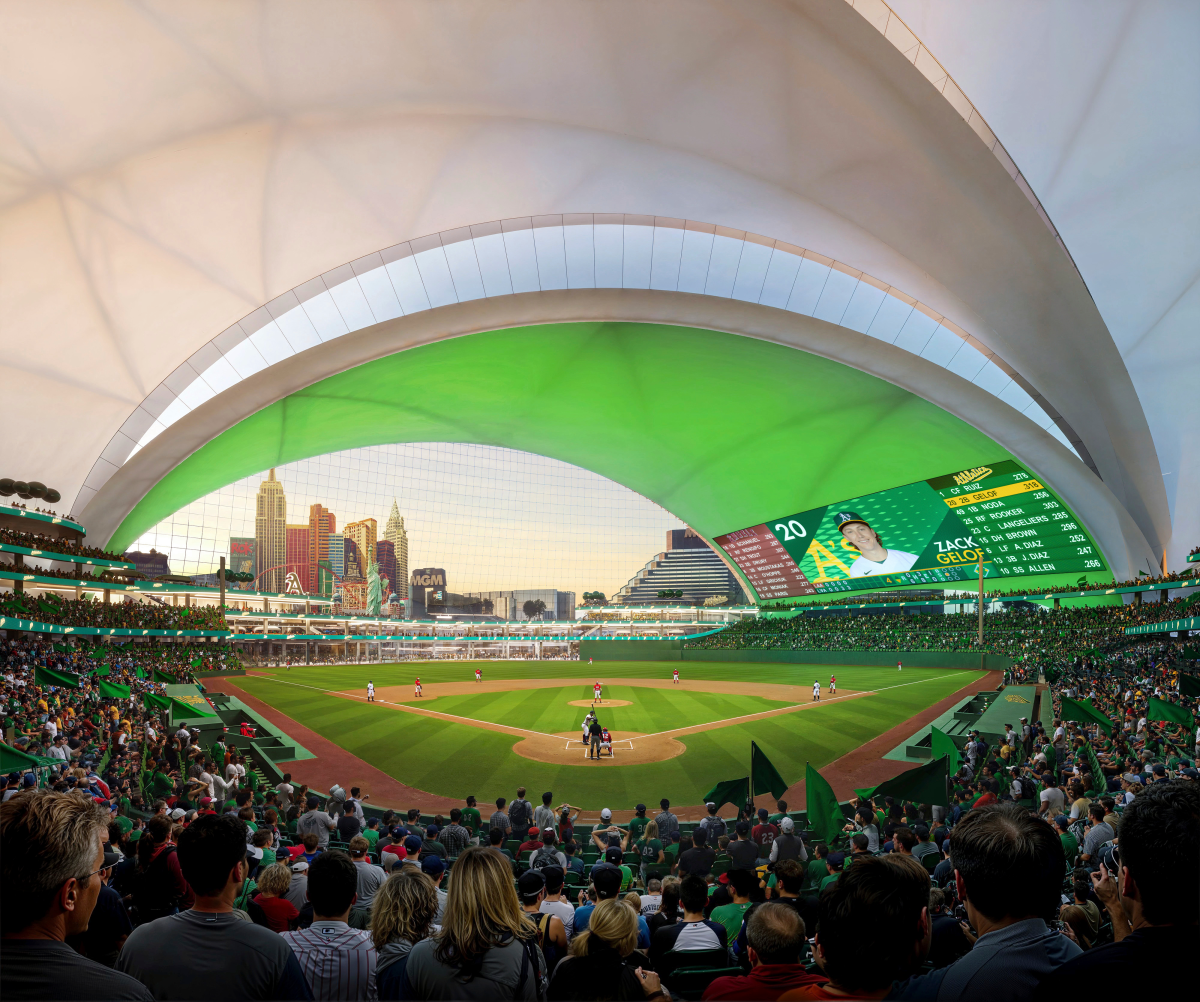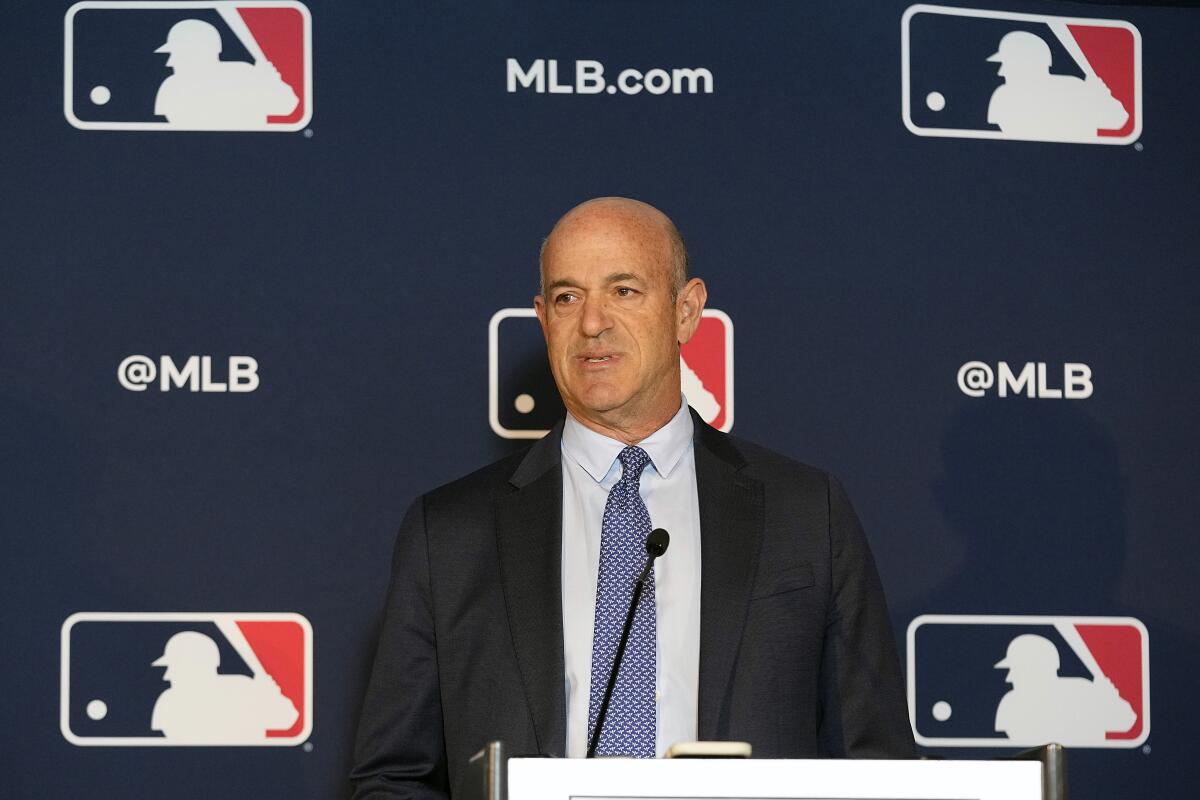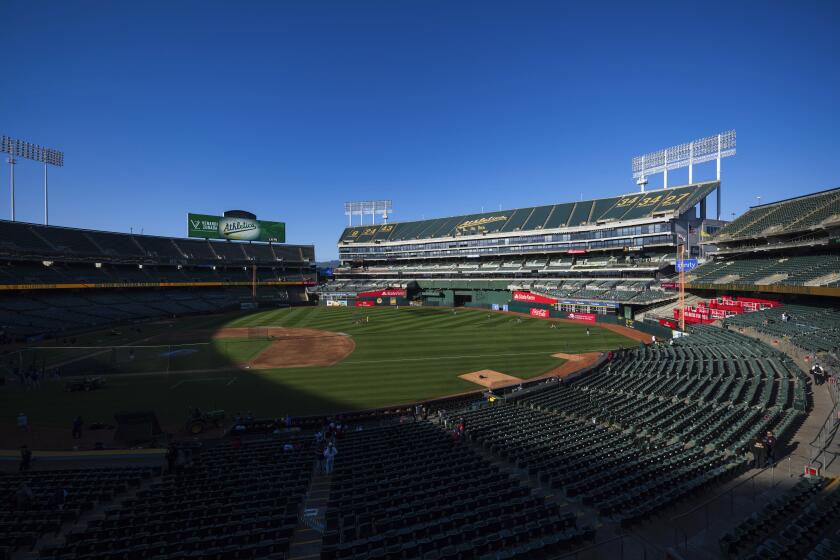A’s want to intervene in Nevada case. For their proposed Vegas stadium, time is money

- Share via
On Thursday, National Hockey League owners approved the relocation of the Arizona Coyotes to Salt Lake City. The team will be playing in Salt Lake City next season. Done deal.
In November, Major League Baseball owners approved the relocation of the Oakland Athletics to Las Vegas. The team plans to play in Sacramento for the next three years, with the intention of moving into a new ballpark in Las Vegas in 2028. Done deal?
The A’s themselves might be growing a wee bit concerned, based on a court filing this week.
Quick rewind: The Nevada Legislature last June approved $380 million in public funding toward the new ballpark. The governor promptly signed the bill, which leaves the A’s and owner John Fisher responsible for the balance of the estimated $1.5-billion construction cost.
The Athletics unveil renderings of their future $1.5-billion stadium in Las Vegas. Some say it resembles the Sydney Opera House. A designer compares it to ‘a spherical armadillo.’
A Nevada teachers’ union announced two challenges to the public funding, pursuing a referendum that would let voters decide and filing a lawsuit alleging the bill was unconstitutional.
MLB commissioner Rob Manfred said last October that “an adverse development with respect to that referendum … would be a significant development.”
The pitch to voters could be attractive: Do you want to hand over hundreds of millions of dollars to an out-of-state billionaire? In an Emerson College poll of likely Las Vegas voters released this month, 52% opposed public funding for the ballpark and 32% favored it, with 17% unsure.
However, the referendum becomes a little more of a long shot with each passing day. The A’s and their allies have objected to the proposed language of the referendum petition, and the matter remains unresolved after seven months in the Nevada courts.
Sociologist and civil rights activist Harry Edwards is concerned that Jackie Robinson’s legacy hasn’t made lasting change in baseball or in society.
The union cannot start gathering signatures until the matter is resolved — and would need to collect more than 100,000 signatures by June 26 in order for the referendum to appear on the November ballot.
The lawsuit was filed in February, alleging the public funding violated the state Constitution in as many as five different ways and naming the state of Nevada, the governor and the state treasurer as defendants. Nothing of substance has happened in that case since then.
With the referendum, the clock could run out on the union. With the lawsuit, the clock could run out on the A’s.
So, this week, the A’s asked the court to let them intervene in the lawsuit.

The A’s do not claim to be expert defenders of the Nevada Constitution, but they would like their money in a timely manner. That money could be reduced or eliminated if the court were to rule against the state. That money also could be put on hold should the court grant an injunction until the case is decided, or if the losing party appeals.
“The Athletics … will be affected if SB 1 is found unconstitutional,” the court filing reads. “Without intervention, the Athletics’ ability to protect its (sic) interests will be impaired.”
Under SB 1, the bill that authorized the public funding, that authorization could expire if the A’s have not executed a development agreement and lease agreement within 18 months of MLB relocation approval — that is, within 13 months from now.
“Failing to meet the timelines for the agreements … risks triggering the termination provisions of SB 1,” A’s president Dave Kaval wrote in a court declaration. “Each year of delay will cost the Athletics millions of dollars.”
The A’s agreed to a three-year deal to play at the home of the triple-A Sacramento River Cats, with an option for a fourth year if the Las Vegas ballpark is not ready in 2028.
As The Times first reported in November, and as Fisher himself confirmed as recently as last month, he is seeking to sell a share of ownership to outside investors for $500 million. He would then use the proceeds to help pay for the new Las Vegas ballpark. Uncertainty around the public funding could spook potential investors.
I emailed each of the three lawyers who signed the A’s filing to ask whether the team was saying the costs to move to Las Vegas could go up by as much as $380 million but the team would still make the move, or whether the team was saying the additional financial burden could be so prohibitive that it may not move to Las Vegas at all. None of the lawyers responded to the emails.
Could be neither. Could be nothing more than the A’s looking out for their interests, rather than entrusting that to a third party. The proposed ballpark site currently is occupied by the now-shuttered Tropicana hotel, with demolition targeted for October. But, as they say, nothing is official until the shovels hit the ground.
More to Read
Go beyond the scoreboard
Get the latest on L.A.'s teams in the daily Sports Report newsletter.
You may occasionally receive promotional content from the Los Angeles Times.














